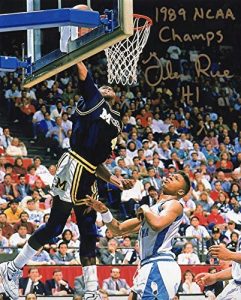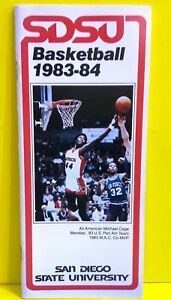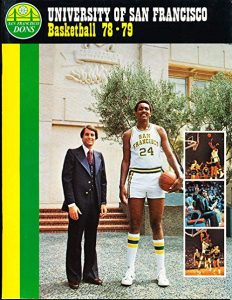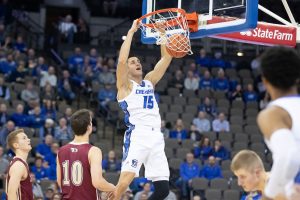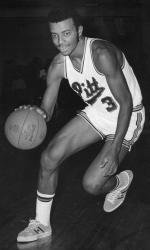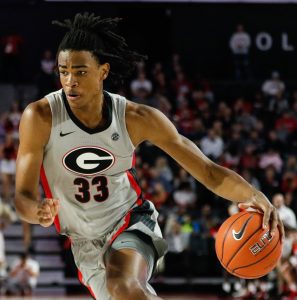With the 2019 NBA draft taking place this week, we will spend the days ahead taking a walk down memory lane with a choice collection of players who are celebrating an awesome anniversary this year. From a future Hall of Famer selected 2nd overall in 1959 (60th anniversary) through a conference POY picked in the 2nd round in 2009 (10th anniversary), these stars have all seen their dreams come true in past drafts. We continue our series with Glen Rice, whose 184 PTS during the 1989 NCAA tourney remains a reord 3 decades later. His sweet shooting stroke also served him well in the NBA, where he 3-PT Shootout champion in 1995, All-Star Game MVP in 1997, and an NBA champion in 2000. HoopsHD’s Jon Teitel got to speak with Glen the 30th anniversary of both his terrific tourney performance in March/April and then getting drafted a couple of months after that.
Take me through the 1987 NCAA tourney:
You had 21 PTS/12 REB in a win over Navy: where does David Robinson’s 50-PT performance in defeat rank among the best that you have ever seen? That was by far the best. We knew that he was good but we were in awe of a 7-footer moving so well and showing so many skills. We had not faced anyone like that.
You had 22 PTS/10 REB in a loss to North Carolina while your teammate Gary Grant had a triple-double with 24 PTS/10 REB/10 AST (JR Reid/Kenny Smith combined for 49 PTS in the win): could you tell at the time that everyone on the court was going to end up in the NBA?! At that time the other 3 were getting a lot more publicity than I was but you could see the handwriting on the wall. JR was known ever since his freshman year as a big guy and was playing very well so I knew that he had a really good shot to go in the 1st round (which he did, getting picked 5th overall in 1989).
In 1989 you were named an All-American after averaging 25.6 PPG and shooting 52% from behind the arc: what did it mean to you to win such an outstanding honor? It meant that all of the hard work I had put in was paying off and it gave me the confidence that I belonged among the top players in the nation.
Take me through the magical 1989 tourney:
Just days before the tournament started, Coach Bill Frieder announced that he would become head coach at ASU, so athletic director Bo Schembechler fired Frieder and named assistant Steve Fisher as interim coach: what was it like going through that coaching change, and how was the team able to maintain their focus? It was quite a whirlwind! You do not want it happening at that time but we understood what was going on and that Bo wanted a Michigan man coaching a Michigan team. Bill wanted to coach us at the time and we talked to him about it. We also knew that Steve could step in and become the head coach so nothing really changed except for the fact that me and the other seniors had to step up and become better leaders. Bo gave us a motivational speech that took us above and beyond.
You scored 34 PTS/13-19 FG in a 5-PT win over UNC (Reid scored 26 PTS): did it feel like you had finally gotten the monkey off of your back? Revenge was definitely on our minds after they knocked us out each of the 2 previous years so it was sweet. We were not going to be denied by them even though they were a good team.
You scored 28 PTS/12-24 FG in a 2-PT win over conference foe Illinois (Kenny Battle scored 29 PTS) thanks to a put-back by Sean Higgins with 1 second left: where does Higgins’ shot rank among the most clutch that you have ever seen? That is #1 because if you take that away then we would have lost the game. He was at the right place at the right time: it was win or go home. Illinois dominated us throughout the regular season and had a lot of pro players so it was another monkey off of our back.
You had 31 PTS/11 REB in a 1-PT OT win over Seton Hall thanks to Rumeal Robinson making 2 FT with 3 seconds left in OT (John Morton scored 35 PTS in 37 minutes): did you think that Rumeal was going to make both FTs, and what was the reaction like when you got back to campus? I was hopeful that he was going to make both FTs. He was in a similar situation against Wisconsin and missed them both but was ready and stepped up and did what he had to do. We saw the scene on TV before we arrived: there were a lot of happy fans!
You were named Final Four MOP after breaking Bill Bradley’s record for points in a single tourney with 184: how did that tourney change your life and will anyone break your record? It just shows you that hard work pays off. I was in a rhythm and my teammates knew it. I think that it was 1 of the highlights of my career and made a huge difference: if not it might have only been top-20. Buddy Hield came close in 2016 but the best guys in the NCAA do not stick around long enough and their teams do not play long enough so I do not see it happening anytime soon.
In the summer of 1989 you were drafted 4th overall by the Miami Heat (8 spots ahead of Mookie Blaylock): how did it feel to get drafted by an expansion team? It did not really matter: I just wanted an opportunity to fulfill my dream and give them my best effort. I was fortunate to go to Miami because I got to grow along with the team. We experienced a lot of losing but it made me stronger.
In 1995 you scored a career-high 56 PTS/20-27 FG/7-8 3PM/9-10 FT in 45 minutes during a 6-PT win over Orlando: was it just 1 of those scenarios where every shot you put up seemed to go in because you were “in the zone”? Oh yes: right before that game I sensed that I would have a pretty good game. The Magic had Shaquille O’Neal/Penny Hardaway so they came in with a chip on their shoulder and seemed to be pushing us aside: their cockiness was the only fuel that I needed. After I hit my 1st 2 shots it felt like throwing a rock into the ocean.
You were named an All-Star for 3 straight years from 1996-1998 but your best performance was in 1997 when you set an All-Star record by scoring 20 PTS/8-11 FG in the 3rd quarter and were named MVP: what did it mean to you to be named MVP, and how were you able to play your best among the best? I was having a good year that season and had been on that stage before so I felt very comfortable. I started that game playing not too well but then I started cooking and my teammates got me the ball. It was amazing to see guys like Michael Jordan/Scottie Pippen passing me the ball: I tried to make the best of it and was delighted that they were looking to me. The icing on the cake was doing it in front of the 50 Greatest Players of all time: I was like a kid in a candy store!
In 2000 you won an NBA title as a member of the Lakers: what did it mean to you to win a title? Your 1st dream as a kid is to make it to the NBA and your 2nd goal is to win a title. To win it with a franchise like the Lakers was a huge achievement: I felt like I had finally done it. It was remarkable but also inexplicable. I won 2 titles in high school and 1 in college so it just showed that I am a winner.
You finished your career with 1559 3PM, which remains in the top-30 all-time: what is your secret for 3-PT shooting? You can have all the right techniques but if you do not get into the gym you will never be a great shooter: you have to put in the work. It was a craft that I worked very hard at and you cannot be afraid to take a shot even after you miss a couple in a row. I was not going to settle for being an okay shooter.
You averaged 18.3 PPG during your 15-year NBA career (playing exactly 1000 games): when people look back on your career, and how do you want to be remembered the most? I did not want to be labeled as just a 3-PT shooter but it just happened that way. I want to be remembered as a good person/teammate who was dedicated to the game. I treated everyone with respect and am fine with that.
After retiring you became the owner of G-Force Fights (a Miami-based MMA promotion company) and got married: what do you hope to do in the future? I wanted to help guys achieve their dreams just like I had in the past with AAU camps: we had several guys who went on to fight in the UFC. I am happy and getting to spend a lot more time with my kids and catching up on things that I have missed so it is beautiful. I will keep striving to do the right thing.

